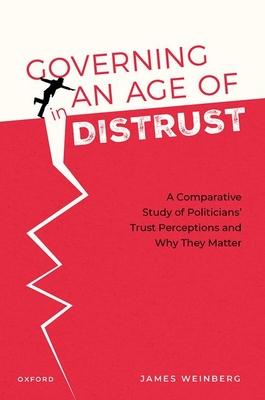Despite the existence of a large literature on themes relating to trust and distrust in politics, there has been no sustained research that directly engages with the primary objects of trust: politicians. This is an intriguing blind spot in political science that leaves us without any understanding of how politicians appraise a contemporary climate of extreme or generalised distrust or indeed how the existence of a low-trust/high-blame environment affects their decision-making and the quality of public governance.
Governing in an Age of Distrust tackles this important gap head on by asking not only whether the public trusts in politicians, but also whether politicians accurately perceive and act upon the trust placed in them. In doing so, Weinberg draws on unique survey and interview data gathered from nationally and locally elected politicians in different countries that have faced a crisis of political trust in recent decades - principally the United Kingdom, Canada, and South Africa. The work identifies different types of ’political trustees’ and subsequently analyses the relationship between perceptions of trust and a variety of outcomes such as politicians’ blame avoidance behaviour and personal wellbeing. Taking a new and innovative approach to research on trust and elite political behaviour, the author tackles questions that are arguably of paramount importance if we are to understand when, why, and how politicians do or do not deliver on the promise of democracy.| FindBook |
有 1 項符合
Governing in an Age of Distrust的圖書 |
 |
Governing in an Age of Distrust 作者:Weinberg 出版社:Oxford University Press, USA 出版日期:2024-02-28 語言:英文 規格:精裝 / 普通級/ 初版 |
| 圖書館借閱 |
| 國家圖書館 | 全國圖書書目資訊網 | 國立公共資訊圖書館 | 電子書服務平台 | MetaCat 跨館整合查詢 |
| 臺北市立圖書館 | 新北市立圖書館 | 基隆市公共圖書館 | 桃園市立圖書館 | 新竹縣公共圖書館 |
| 苗栗縣立圖書館 | 臺中市立圖書館 | 彰化縣公共圖書館 | 南投縣文化局 | 雲林縣公共圖書館 |
| 嘉義縣圖書館 | 臺南市立圖書館 | 高雄市立圖書館 | 屏東縣公共圖書館 | 宜蘭縣公共圖書館 |
| 花蓮縣文化局 | 臺東縣文化處 |
|
|
圖書介紹 - 資料來源:博客來 評分:
圖書名稱:Governing in an Age of Distrust
內容簡介
作者簡介
James Weinberg, Assistant Professor, University of Sheffield
|










